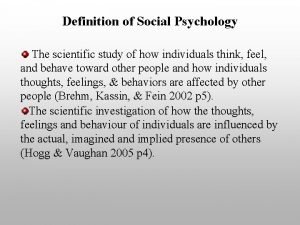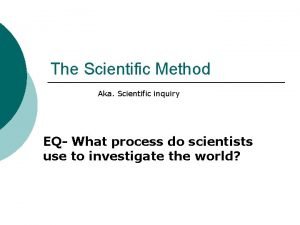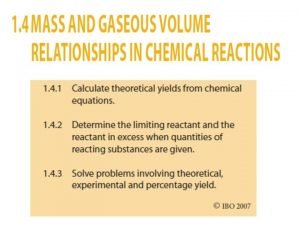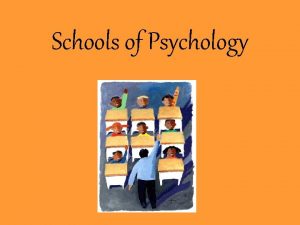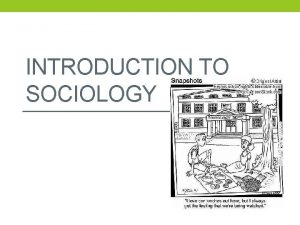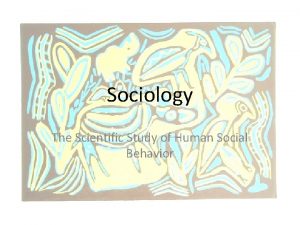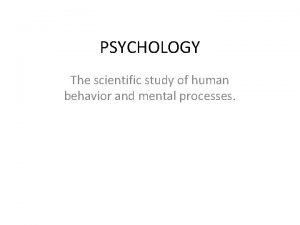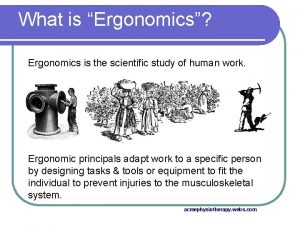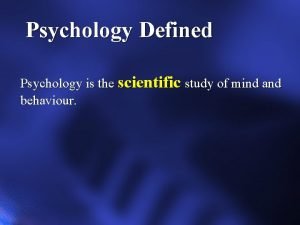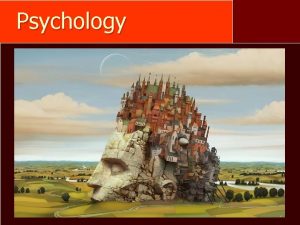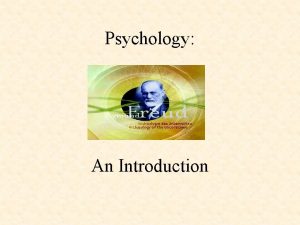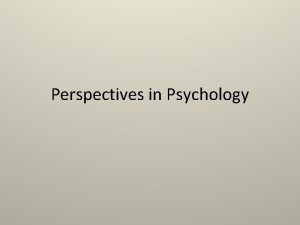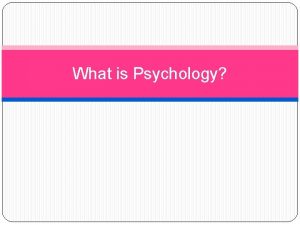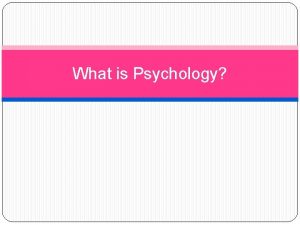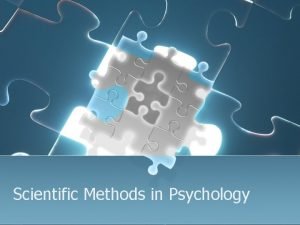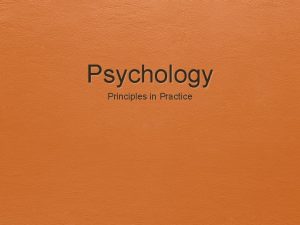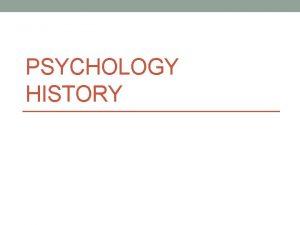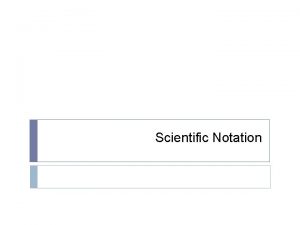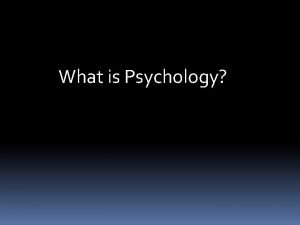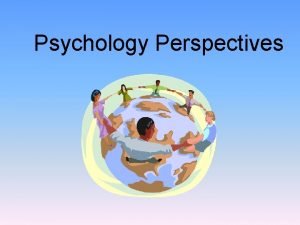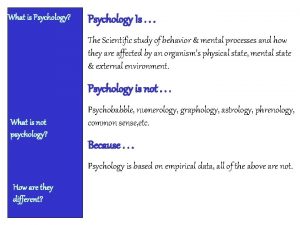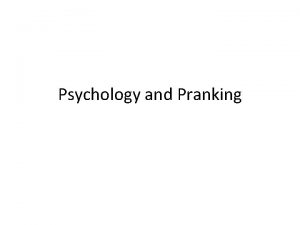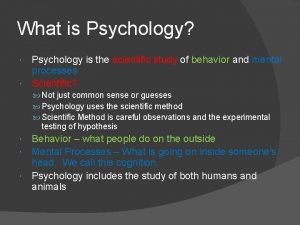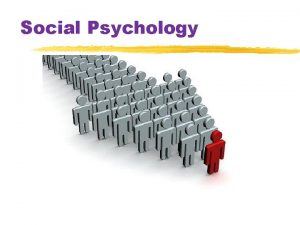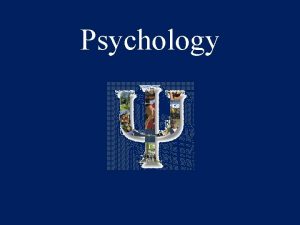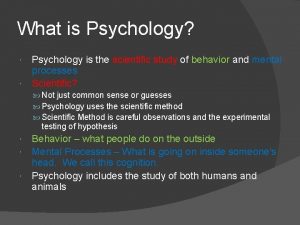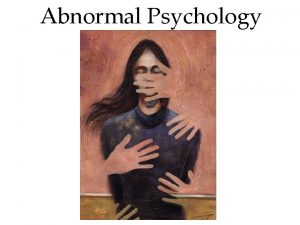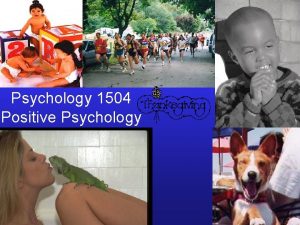Psychology Psychology Defined n the scientific study of


































- Slides: 34

Psychology

Psychology Defined n the scientific study of the human mind and its functions, especially those affecting behaviour in a given context. (Oxford English Dictionary)

What is Science of behaviour and mental Psychology? processes n Colloquially: Study of how and why humans act as they do n Summarily:

Kinds of Questions Asked n n n Why do we dream? What makes a person do terrible things? (genocide, murder, etc. ) What is the self? Can we understand our brains? How is personality developed? What is it that makes you? How does memory work? Can people “really” change? What are mental illnesses? What is sexuality? Is there such a thing as ESP? How does the mind-body connection affect us? n Which is more important, nature or nurture? n What must people do to successfully change their behaviours? n What factors make behaviourmodification programs successful? n

One of MANY examples: The Case of Kitty Genovese n n The Case of Kitty Genovese - Kitty was murdered on the street outside her New York City apartment after loud shouting was heard 38 people witnessed the murder but did nothing to stop it Psychologists have long been interested in our unwillingness to get involved in uncomfortable situations even if someone’s personal safety is at risk People have a tendency see themselves as bystanders in such situations rather than as ACTORS are people who become active participants in a situation

Types of Psychology Experimental Psychology n The branch of the discipline that sets up experiments to see how individuals act in particular situations n Question - Would you help a complete stranger that was being threatened with violence from another person?

Types of Psychology n Clinical Psychology develops programs for treating individuals suffering from mental illnesses and behavioural disorders n Eg. Psychologists treat dangerous offenders in federal prisons in an attempt to prevent them from reoffending on release

An example? n Cognitive Behavioural Therapy n https: //www. youtube. com/watch? v=Ho. FN s-3 r 0 Go n Response?

Application: Thinking Psychologically n Schadenfreude: n Pleasure derived from someone else’s misfortune – https: //www. youtube. com/watch? v=Tva 0 xq-e. Dv. I

What’s the difference between psychology and psychiatry? ? n. A psychiatrist has a degree in medicine and a psychologist has a doctoral-level degree in psychology – Psychologists receive graduate training in psychology and pursue either a Ph. D. or Psy. D. in clinical or counseling psychology. – Psychiatrists are physicians that have specific training in the assessment, diagnosis, treatment, and prevention of mental illnesses n. A second important distinction between the two careers is that psychiatrists can prescribe medications, while in most states psychologists cannot

n n n Both psychiatrists and psychologists are typically trained to practice psychotherapy -- talking with their patients about their problems. But the differences in background and training translates into different approaches to solving your mental health problems. Psychologists look closely at your behavior. “If you’re depressed and can’t get out of bed, there’s a behavioral activation, ” says C. Vaile Wright, Ph. D, a director at the American Psychological Association. Psychologists will track sleep patterns, eating patterns, and the negative thoughts that might be causing or contributing to the problem. “Psychiatrists have a stronger sense of biology and neurochemistry, ” says Ranna Parekh, MD, a director at the American Psychiatric Association. “Theirs is going to be a diagnosis of exclusion. For instance, before we call someone depressed, we’re going to make sure they don’t instead have some vitamin deficiency or thyroid problem. ” Once they’ve made a mental health diagnosis, psychiatrists often prescribe you medicine

A Bit of Fry and Laurie, perhaps? n https: //www. youtube. com/watch? v=ws. RK Qxq 0 Cz 8

Psychological Schools of Thought Like the other social sciences, psychology has been divided into a number of schools of thought: n Structuralism n Functionalism n Psychoanalytic Theory n Behaviouralism n Learning Theory n Humanistic Psychology

Clarification n Today, most psychologists have an eclectic outlook on psychology. n They often draw on ideas and theories from different schools rather than holding to any singular outlook or school of thought

1 ~ Structuralism n n Mid-to-late 19 th century Europe Influenced by changes in understanding of biology, geology, chemistry, etc. School of thought that sought to identify the components (structure) of the mind (the mind was the key element to psychology at this point). Best way to learn about the brain and its functions was to break the mind down into its most basic elements. – whole is equal to the sum of the parts.

1 ~ Structuralism n Wilhelm Wundt, pioneer Structuralist, set up the very first psychological laboratory in 1879 in Germany. n Following Wundt was Titchner who popularized the field (one of Wundt's students). n Titchner used “introspection” to try to understand the conscious mind.

1 ~ Structuralism n Tried to understand the basic elements of consciousness using a method known as introspection – Common use of the word - informally examining our own internal thoughts and feelings. When we reflect on our thoughts, emotions, and memories and examine what they mean, we are engaging in introspection

1 ~ Structuralism n Psychological use of the word: a process of having a person "look inward", focus on, and try to understand the emotion or thought they are experiencing at that moment involved training people to carefully and objectively as possible analyze the content of their own thoughts n Not a short “venting” session n – a rigidly controlled, arduous experimental procedure.

2 ~ Functionalism n Another n of the earliest schools An American reaction to German Structuralism was shaped by the work of William James – influenced by evolutionary theory of Charles Darwin. n Rather than focusing on the elements (structure) of consciousness, functionalists focused on the purpose (function) of consciousness, i. e. , behavior. – How have behaviours evolved to assist organisms to adapt, survive and flourish

2 ~ Functionalism is the doctrine that what makes something a thought, desire, pain (or any other type of mental state) depends not on its internal constitution, but solely on its function, or the role it plays, in the cognitive system of which it is a part. More precisely, functionalist theories take the identity of a mental state to be determined by its causal relations to sensory stimulations, other mental states, and behavior. n For (an avowedly simplistic) example, a functionalist theory might characterize pain as a state that tends to be caused by bodily injury, to produce the belief that something is wrong with the body and the desire to be out of that state, to produce anxiety, and, in the absence of any stronger, conflicting desires, to cause wincing or moaning. According to this theory, all and only creatures with internal states that meet these conditions, or play these roles, are capable of being in pain. n

Little Video Overview / Review n https: //www. youtube. com/watch? v=q. Be 9 qj. X-Ahg

3 ~ Psychoanalytical School n The theory of personality organization and the dynamics of personality development laid out by Sigmund Freud (late 19 th century) n Emphasized role of unconscious forces and childhood events that can influence the mental functioning of adults. n Starting with his publication of The Interpretation of Dreams in 1899, his theories began to gain prominence.

3 ~ Psychoanalytic Theory Psychoanalysis: technique of analyzing the psyche n ideas that making conscious someone’s unconscious thoughts and motivations will result in “insight”. n – The aim of psychoanalysis therapy is to release repressed emotions and experience n unconscious energies and drives influence behavior. – Character development understood in terms of a series of psychosexual stages. – Conflicts that occur during each of these stages can have a lifelong influence on personality and behavior.

3 ~ Psychoanalytic Theory The mind is divided into two parts: the conscious (aware of ) and the unconscious (not aware of) n According to psychologists, our unconscious mind has more influence than our conscious mind on our personalities and behaviour n

The Unconscious Mind The Unconscious mind is divided into three parts: Id – which encourages us to seek physical satisfaction 2. Superego – prompts us to do the moral thing, not the one that feels best 3. Ego – the referee between the two and deals with external reality, this is our most conscious self 1.

Sigmund Freud (1856 -1939) Founder of psychoanalytic theory n childhood experiences, involving relationships with parents and family, stored in our unconscious mind n Often unaware of these memories n – Powerful influence on our actions n Those that live with a general sense of frustration, our behaviour may become neurotic and connected with anxiety or obsessiveness – treated using dream analysis, hypnosis and individual counseling n Freud believed that individual sexual satisfaction or frustration was the key element in personality development

n n Freud and his theories are deeply misunderstood; he had many wild theories about sex, mainly in regards to unconscious sexual feelings in very small children who had hardly even learned to reason. These theories are not really considered to be accurate today by psychologists, nor is hypnotherapy a very popular or accepted method for treating people. But Freud’s method of talking to people in order to cure them of their mental issues, and his work concerning the subconscious, the Id, and the Ego, were groundbreaking—and laid the foundation for much of what is understood about psychology today.

Psychoanalytic Technique: “Free associate” n a technique used in psychoanalytic therapy – help patients learn more about what they are thinking and feeling § freely share thoughts, random words, and anything else that comes to mind, regardless of how coherent or appropriate thoughts are – Big impact on future of psychology (e. g. , Rorschach ink blot test) Use dreams, projections and free association to root out repressed feelings and gain self-insight n Symptoms of mental disorders and various other types of emotional trauma can be mitigated or even cured by talk therapy and self-discovery n

Who Doesn’t Love a Video? ? n https: //www. youtu be. com/watch? v=i Mk. J 9 vtn 8 j. Q

Criticism… Psychoanalysis often searching for meaning in every action, every symbol in every dream n But sometimes, as even Freud himself admits, “sometimes a cigar is just a cigar” n n n When Sigmund Freud invented psychoanalysis, he headed out from the idea that malfunctions in the mind are the results of traumas suffered in the past. Regression would allow the patient to stroll down memory lane, pinpoint the sore spot and rub it away with Freud's healing techniques that were again based on linear cause and effect. Chaos Theory however taught us that nature most often works in patterns, which are caused by the sum of many tiny pulses.

Alfred Adler (1870 -1937) Part of psychoanalytic school n Broke away to form his own school: n Individual Psychology n From childhood, people work toward overcoming this inferiority and asserting their superiority over others. Adler referred to this as 'striving for superiority' and believed that this drive was the motivating force behind human behaviors, emotions, and thoughts.

n Believed that difficulties people encounter in gaining self-esteem and recognition, if not overcome by the normal means lead to compensatory behaviour and resultant personality disorders which are now widely referred to as an inferiority complex.

Carl Jung (1875 -1961) n n n Major figure of early psychology Interested in medicine and spirituality… led to study of psychiatry Close to, then split from Freud Started his own school: Analytical Psychology interested in dreams and symbols human psyche in three parts: – – – the ego (the conscious mind), the personal unconscious collective unconscious. § a reservoir of all the experience and knowledge of the human species

Carl Jung … Process of individuation important for a person to become whole and fully developed as a human being. (True self) n Responsible for the identification of the Extroverted (outward-looking; outgoing; rely on others for sense of well being) and Introverted (inward-looking; emotionally self sufficient; well being comes from within) personality types. n other aspects of Jung's work that is influential is his approach to the analysis of dreams. n
 Collection of well defined objects
Collection of well defined objects Social psychology is the scientific study of:
Social psychology is the scientific study of: Information gathered during an experiment
Information gathered during an experiment How is a scientific law different from a scientific theory?
How is a scientific law different from a scientific theory? Quantitative study of reactants and products
Quantitative study of reactants and products Stoichiometry is defined as the quantitative study of
Stoichiometry is defined as the quantitative study of Structuralism in psychology definition
Structuralism in psychology definition Linguistics is the scientific study of
Linguistics is the scientific study of Herbert spencer introduction
Herbert spencer introduction India baby tossing
India baby tossing The scientific study of trees
The scientific study of trees The scientific study of behavior and mental processes
The scientific study of behavior and mental processes Finished files are the result of years of scientific study
Finished files are the result of years of scientific study Ergonomics is the scientific study of
Ergonomics is the scientific study of Mendelian genetics vocab
Mendelian genetics vocab Hát kết hợp bộ gõ cơ thể
Hát kết hợp bộ gõ cơ thể Lp html
Lp html Bổ thể
Bổ thể Tỉ lệ cơ thể trẻ em
Tỉ lệ cơ thể trẻ em Voi kéo gỗ như thế nào
Voi kéo gỗ như thế nào Tư thế worm breton là gì
Tư thế worm breton là gì Chúa yêu trần thế
Chúa yêu trần thế Các môn thể thao bắt đầu bằng tiếng nhảy
Các môn thể thao bắt đầu bằng tiếng nhảy Thế nào là hệ số cao nhất
Thế nào là hệ số cao nhất Các châu lục và đại dương trên thế giới
Các châu lục và đại dương trên thế giới Công thức tính thế năng
Công thức tính thế năng Trời xanh đây là của chúng ta thể thơ
Trời xanh đây là của chúng ta thể thơ Cách giải mật thư tọa độ
Cách giải mật thư tọa độ Phép trừ bù
Phép trừ bù độ dài liên kết
độ dài liên kết Các châu lục và đại dương trên thế giới
Các châu lục và đại dương trên thế giới Thơ thất ngôn tứ tuyệt đường luật
Thơ thất ngôn tứ tuyệt đường luật Quá trình desamine hóa có thể tạo ra
Quá trình desamine hóa có thể tạo ra Một số thể thơ truyền thống
Một số thể thơ truyền thống Cái miệng nó xinh thế chỉ nói điều hay thôi
Cái miệng nó xinh thế chỉ nói điều hay thôi

